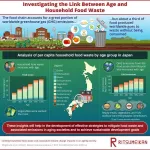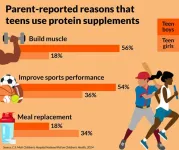Food production is one of the pillars of human civilization and underlies many of the changes caused by humans on planet’s landscapes. Producing food and getting it to people’s plates entails a significant expenditure of energy and resources. Unfortunately, approximately one third of all food produced globally is not consumed and discarded. Hence, to build sustainable societies, it is essential to minimize food waste.
In Japan, based on estimates reported by governmental institutions, an astonishing 2.47 megatons of food waste was generated in households in 2021, much of which was likely still edible. Thus, Japan has quite some room for improvement in terms of minimizing household food waste. The problem, however, is that not much is known about what types of food contribute the most to food waste, their associated greenhouse gas emissions, and whether specific sectors of the population are more prone to wasting food.
Now, a research team led by Associate Professor Yosuke Shigetomi from College of Science and Engineering, Ritsumeikan University, Japan, along with Ms. Asuka Ishigami from Nagasaki University, Associate Professor Andrew Chapman from Kyushu University, and Associate Professor Yin Long from The University of Tokyo, Japan set out to tackle this knowledge gap. Through a detailed analysis of food waste in Japanese households incorporating demographics and dietary trends, they established important links between the amount and type of food waste and their associated emissions and age. Their findings were published in Nature Communications on 21 October, 2024.
To conduct their analysis, the researchers gathered food consumption and waste statistics from previously released surveys. The information enabled the team to determine the ratios between edible/inedible parts of over 2,000 food products, as well as the physical amount of household food waste for various food categories. By combining these data with food-related socioeconomic statistics, they explored how age and other factors affect the amount and type of about 200 foods wasted.
Worth noting, Dr. Shigetomi highlights the important contributions by Ms. Asuka Ishigami in this study. “Ms. Asuka Ishigami was my supervised student at my former affiliation, Nagasaki University. Although she graduated as a bachelor in 2022, she worked hard to collect all the fundamental data and conduct the initial analysis for this study through her dissertation,” says Dr. Shigetomi.
One of the most notable findings was that household food waste per person appears to increase significantly with the age of the household’s head. The difference was quite stunning, as elderly households potentially produced nearly twice as much food waste compared to households in which the head was in their 30s. Vegetables were also the most often wasted food type. Similarly, greenhouse gas emissions associated with food waste also increased with the age of the household head. In this case, however, vegetables, ready meals, and fish and seafood were the biggest contributors.
Taken together, the results highlight how age might be directly linked to food waste and associated greenhouse gas emissions. “An aging population would be one of the hidden but key factors for consideration when proposing strategies to reduce food waste directly generated by households,” remarks Dr. Shigetomi. Moreover, identifying vegetables and meats as an either major or minor source of food waste but both major sources of greenhouse gases also emphasize the importance of understanding which food categories contribute most to these issues, which in turn allows for developing more targeted interventions and policies. “It will be essential to pay closer attention to the dietary preferences and lifestyles among different generations, particularly under the desire of dietary shifts towards vegetarianism for combating climate change,” adds Dr. Shigetomi.
The findings of this study will help in the development of effective strategies for reducing food waste and raising awareness of the environmental threat it poses. Educational campaigns could go a long way in helping people be more mindful about the food they consume, how they cook and store it, and how much of it ends up being thrown away.
***
Reference
DOI: https://doi.org/10.1038/s41467-024-51553-w
About Ritsumeikan University, Japan
Ritsumeikan University is one of the most prestigious private universities in Japan. Its main campus is in Kyoto, where inspiring settings await researchers. With an unwavering objective to generate social symbiotic values and emergent talents, it aims to emerge as a next-generation research university. It will enhance researcher potential by providing support best suited to the needs of young and leading researchers, according to their career stage. Ritsumeikan University also endeavors to build a global research network as a “knowledge node” and disseminate achievements internationally, thereby contributing to the resolution of social/humanistic issues through interdisciplinary research and social implementation.
Website: http://en.ritsumei.ac.jp/
Ritsumeikan University Research Report: https://www.ritsumei.ac.jp/research/radiant/eng/
About Associate Professor Yosuke Shigetomi from Ritsumeikan University, Japan
Dr. Yosuke Shigetomi is an Associate Professor at the Department of Civil and Environmental Engineering, College of Science and Engineering, Ritsumeikan University, Japan. He is also appointed as a Co-Researcher at the Research Institute of Humanity and Nature. He received his PhD (Energy Science) from Kyoto University in 2016. His current research focuses on carbon neutrality, aging society, and social equity. He has published over 39 peer-reviewed papers on these and related topics. He is a member of the Institute of Japan Life Cycle Assessment and the International Society for Industrial Ecology.
Funding information
This study was supported by JSPS KAKENHI (grant numbers JP21H03673 and JP24K03149) and Research Institute for Humanity and Nature (RIHN: a constituent member of NIHU) Project No. RIHN14210156.
END




